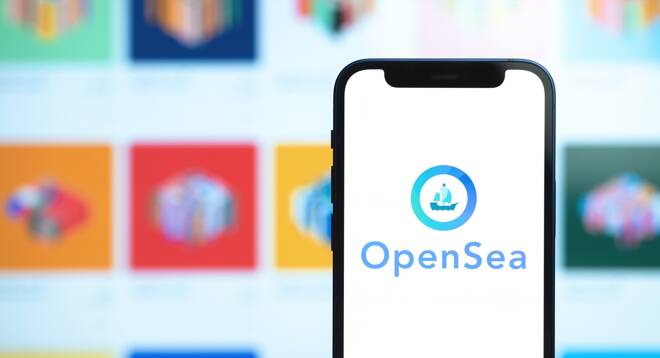Advertisement
Advertisement
OpenSea to Allow NFT Purchases with Bank Cards, Apple Pay, and Google Pay
By:
This week, MoonPay announced a new partnership with OpenSea which will remove the need for NFT buyers to purchase crypto to make payment.
Key Insights:
- OpenSea partners with MoonPay to allow NFT purchases with bank cards, Apple Pay, and Google Pay.
- Trading volumes have retreated since January’s record high, with rising crypto prices of influence.
- More diversified NFT payment options could decouple the NFT marketplace from the crypto market.
OpenSea has seen NFT trading volumes retreat since January’s all-time highs. The fall in trading volumes has coincided with an upward trend in cryptocurrency prices.
On Friday, we reported recent monthly trading volume trends and the root causes of the marked decline in volumes. A link to the value of cryptocurrencies is evident when considering the trend in NFT trading volumes.
Rising crypto prices translate into more expensive NFTs, where NFT prices are crypto-based. In March, ETH rose by 12.4% and 8.6% in February.
A shift away from crypto pricing and payment could decouple the inverse relationship between NFTs and the crypto market.
OpenSea Partners with MoonPay to Allow Bank Card Payments
On Friday, MoonPay announced a new partnership with OpenSea. OpenSea will use MoonPay’s NFT Checkout to give OpenSea users better access to NFTs.
As per Friday’s announcement,
“The integration, which will be rolled out in phases, allows OpenSea users to easily purchase an NFT using a debit or credit card, sidestepping the need to first acquire cryptocurrency. This simplifies the purchasing process and opens up the marketplace to a wider customer base.”
MoonPay added,
“For the first time, OpenSea customers will be able to purchase NFTs using a card through MoonPay’s NFT Checkout. Collectors can pay directly with major payment methods like MasterCard, Visa, Apple Pay, and Google Pay.”
MoonPay’s co-founder and CEO said,
“MoonPay’s mission is to unlock ownership and onboard the world to Web3. To be successful, we have to make the process as simple as possible. MoonPay has done that for crypto. And now, in partnership with OpenSea, we’re doing it for NFTs as well.”
On Twitter, MoonPay tweeted that OpenSea users will soon be able to buy NFTs with Visa, Mastercard, Apple Pay, Google Play, and more.
⛵️Sail the @opensea with your card 💳
Soon, you will be able to buy NFTs with @Visa, @Mastercard, @Apple Pay, @GooglePay and more. pic.twitter.com/vHYDT1W776
— MoonPay (@moonpay) April 1, 2022
NFT Marketplaces Partner with Payment Platforms to Broaden Customer Base
In January, MoonPay announced the launch of its NFT Checkout service.
Annnnd we’re live 🔴
Introducing NFT Checkout: the world’s only solution that allows users to purchase an NFT instantly with a card 🛒 💳
Details👇 https://t.co/i7L8OXUyxV pic.twitter.com/6CK1gQrApz
— MoonPay (@moonpay) January 27, 2022
MoonPay’s deal with OpenSea follows a partnership with NFT marketplace Nifty Gateway, an OpenSea competitor.
This year, Coinbase will also be entering the NFT space with the launch of CoinbaseNFT. Earlier this month, FX Empire reported that Coinbase met with more than one hundred creators looking to expedite the launch of the NFT marketplace.
In January, Coinbase announced a deal with Mastercard to allow users to buy NFTs using Mastercard credit and debit cards.
NFT Regulatory Scrutiny Likely to Intensify Near-Term
As more NFT marketplaces forge partnerships with payment providers, regulatory scrutiny could become a factor.
Since the start of the year, the NFT space has seen a marked increase in illicit activity. Plagiarism, NFT hacks, wash trading, money laundering, and rug pulls are some of the many issues that the NFT space contends with today.
Allowing users to purchase NFTs with credit or debit cards will likely force regulators to introduce measures to protect investors. Such an outcome could initially hurt the NFT marketplace before demand returns.
This week, EU lawmakers voted in favor of KYC for ‘private crypto wallets’ that could extend to crypto exchanges. Regulators may well target the NFT space next.
About the Author
Bob Masonauthor
With over 28 years of experience in the financial industry, Bob has worked with various global rating agencies and multinational banks. Currently he is covering currencies, commodities, alternative asset classes and global equities, focusing mostly on European and Asian markets.
Advertisement
